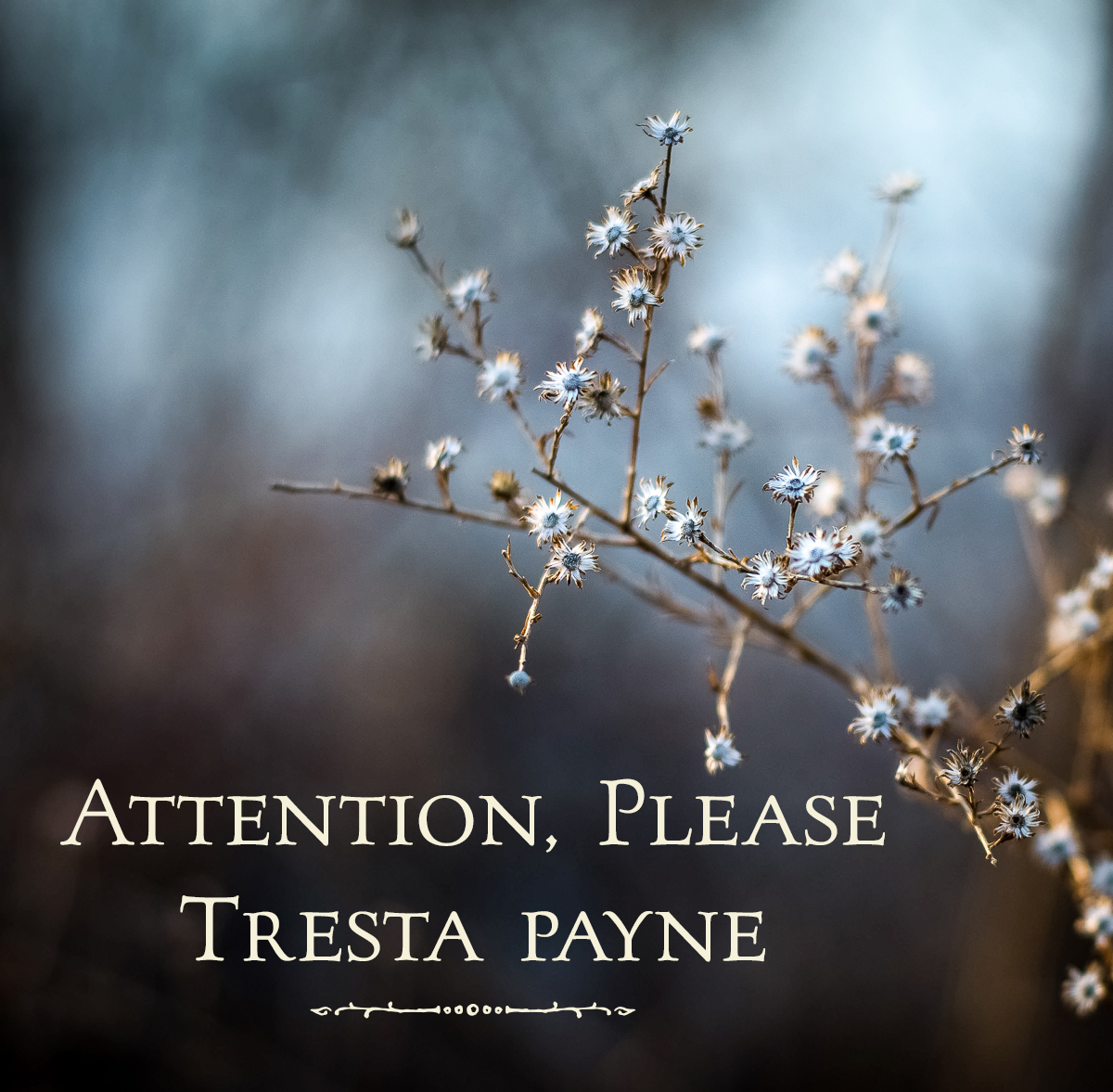Every week I spend several hours studying physics, writing out formulas, and sketching diagrams to try and understand concepts that I will have to discuss on Wednesday with my class. I am impatient with my slowness, and honestly, I’m impatient with physics, itself. I think getting up from the desk or brewing more coffee will help me pay better attention. Physics is not my forte, my jam, or my speciality, but I am expected to hold a conversation with bright young students about torque and equilibrium, so I press on.
Paying attention is hard work.
“There is something in our soul which has a far more violent repugnance for true attention than the flesh has for bodily fatigue.” ~ Simone Weil
I scrolled Instagram on my lunch break last Wednesday because we’d just had our physics discussion and my attention needed a rest. Yes, I recognize the irony. Fellow Cultivator Leslie Bustard had posted a picture of a magazine cover, and I knew I recognized the name of one of the authors listed on it, but I couldn’t remember why it was familiar. This happens to me all the time and I am getting tired of these vague recollections of seemingly useless bits of trivia. I know I read that/heard that/saw that somewhere, but simply recognizing a name or an idea is not evidence of any real understanding. I try to take note of connections and bits of interesting information in my notebook, because I want to hold on to the truth, goodness, and beauty I see. But alas, my coffee-soaked attention span leaks out loose connections.
Jessica Hooten Wilson. I googled the author’s name on my iPad and in the first few results was a reference to Wilson reciting Gerard Manley Hopkins’ poem, As Kingfishers Catch Fire.
I am memorizing that poem. It was an interesting coincidence, but I still had two things separated in my mind—this author’s name and its loose connection to a poem I am memorizing—and I didn’t feel satisfied yet. I had the book of poems with me in class and sure enough, Jessica Hooten Wilson had written an essay on one of Hopkins’ other poems included in the book. I hadn’t remembered the content of her essay, and remembering the connection required the work of Google, but I had chased the clue and found an answer. I scribbled a wild joy of notes in my notebook that looked like mad ravings, but for me they are an Ebeneezer—a marker of goodness.
These little bonuses of attention lead me to wonder—how many things are connected and I pass right by them, too lazy or distracted to follow the trail? I wrote recently about another small connection that took the help of a friend to notice, and the only point of that coincidence seemed to be as a gentle blessing of wonder to both of us. God is mysteriously small and infinitely large and I love that about Him.
“Never in any case whatever is a genuine effort of the attention wasted.” ~ Weil
Before driving home that Wednesday I looked through my podcasts to find something to listen to. I have hundreds of podcast episodes in my app and there’s no real logic to the order I listen to them in—it’s an intuitive stab in the dark, based mostly on feelings. I chose one titled “Study as Prayer and Love for God” from Dr. Andrew Perrin. His talk was centered on Simone Weil’s essay, Reflections on the right use of school studies with a view to the love of God. It’s a mouthful of a title, and Dr. Perrin’s podcast gave me a lot to think about in terms of the true goal of academic study.
I made two barely decipherable voice memos in my phone as I drove: download fay essay (Weil essay); copy repugnant quote. These secretly coded messages are how I do the work of paying attention when I can’t get to my notebook. That night I opened my iPad to search for the essay by Weil and my author search was still open from earlier in the day. I scrolled down through the page, just reviewing and remembering the connection, then googled “Simone Weil study as prayer”. I looked at the first few search results and a name caught my eye—The James G. Martin Center for Academic Renewal. I pressed my browser’s back button and looked through the author search results again. Jessica Hooten Wilson had an essay at The James G. Martin Center for Academic Renewal. The essay topic? Simone Weil’s Reflections on the right use of schools studies with a view to the love of God.
When I pay attention I get wonder in exchange. Small details become markers on the road, breadcrumbs to the kingdom of God. Paying attention to the ways all the parts of our lives are connected reveals the wonder of a God who deals with physics and prayer, who uses our interests and our attention. In a span of just a few hours God used Instagram and Google to connect an author, a poem, a book I’m reading, a podcast, an essay by someone I’ve never read, and a center for academic research I’ve never heard of.
If I am attentive to the world I am paid back tenfold—Christ plays in ten thousand places, as Hopkins says, and the world is bursting with His presence.
“The Key to a Christian conception of studies is the realization that prayer consists of attention.” ~ Weil
In the mornings I open a document and type my prayers, moving my fingers just to keep my attention focused and trusting God to overlook my typos and fragments. I keep lists of requests and leave empty space for answers. I admit that prayer is not a strength of mine, and typing my prayers feels like a second rate attempt at intimacy with God.
Prayer consists of a prolonged attendance to Christ, to my own soul in light of Him, and often to the silence. Study requires me to accept my ignorance while I focus on the material being studied, and to have faith in the process. If my faith is in getting answers—in prayer or in study—I will shortcut the means in pursuit of the ends. But Weil maintains in her essay that if the goal is to develop my attention, geometry (or physics) might be the key to prayer. And for now, typing my prayers is the key to my attention.
Patience sometimes entails doing something in the meantime, and I think, in this way, my life can always be about study and prayer. I work while I wait for answers, and maybe my attention span is growing.
“Those who are unhappy have no need for anything in this world but people capable of giving them their attention.” ~ Weil
I read Weil’s essay several times that night. I loved what she had to say about the merits of study, about prayer, and about empathy. Love of neighbor, she says, means being able to say, “What are you going through?” and to recognize that suffering exists as part of our humanity, the part Jesus joined us in.
To be listened to is more important than to be given answers. Knowing someone else is willing to give attention to your suffering is the kind of companionship and empathy that gets us through this life.
“Only he who is capable of attention can do this,” Weil writes. To empty myself of every other distraction and to truly give attention to someone else is empathy, and empathy lets me enter into relationships with wonder, allowing others to be a surprise. Empathy does not require that I understand, experientially, what another is going through. It only requires that I can give attention to someone besides myself, and offer them “the comfort with which we ourselves are comforted by God” (2 Cor. 1:4).
At the beginning of the school year we started a list of “integrations”—all the ways our studies relate to one another and the world at large. I write down anything the students notice, any connection they find that lights a fire for them—parallels between the Bible and Greek literature, how the Achilles tendon came to be named, how understanding torque helps us in volleyball, where the symbol for “degree” came from, references to Greek mythology in pop culture. Our plan is to compile it at the end of the year as a reflection on our studies, but my ultimate hope is that this is a practice they continue throughout their lives. I’d like to rename it: Reflections on the right use of attention with a view to the wonder of God.
There are algorithms that target me and google-coincidences that are tricks of advertising, but beyond all that is a God who keeps count of the hairs on my head. I’m committed to the holy work of paying attention, to not discounting the small things as coincidences, and in this way I will battle a world that wants to steal my hope and wonder.
The featured image is by the incomparable Julie Jablonski and used with her gracious permission for Cultivating and The Cultivating Project.
And a little something to use if you’d like to share this on social media! 🙂
Tresta Payne learned to appreciate the beauty of God from the landscape of the Pacific Northwest, where she lives with her husband and four children. She builds her own MFA in creative writing through homeschooling her children and tutoring others, finding every excuse to learn and read and grow. After twenty years of homeschooling she is ready for someone to hand her that degree. She enjoys a good, deep discussion with a balance of differing opinions, and works out her own thoughts in writing. Tresta walks a lot on the wild country roads around her home, with her dog and her thoughts and the nearness of God to keep her company.
Leave a Reply
A Field Guide to Cultivating ~ Essentials to Cultivating a Whole Life, Rooted in Christ, and Flourishing in Fellowship
Enjoy our gift to you as our Welcome to Cultivating! Discover the purpose of The Cultivating Project, and how you might find a "What, you too?" experience here with this fellowship of makers!




I love this, Tresta! I’m continually in awe of all the ways God moves through our days and shows us things we didn’t know we were longing for. So many little connections that could never be mere coincidence, but only evidence of His power and unfailing love. thank you for this reminder to keep looking for Wonder. Every day is full of it when He opens our eyes and hearts to truly see.
Tresta, there is so much richness here. Your connection of attention to empathy especially resonated with me on this read:
“To empty myself of every other distraction and to truly give attention to someone else is empathy, and empathy lets me enter into relationships with wonder, allowing others to be a surprise. Empathy does not require that I understand, experientially, what another is going through. It only requires that I can give attention to someone besides myself, and offer them “the comfort with which we ourselves are comforted by God” (2 Cor. 1:4).”
It is what we long for, and what we are called to give. Thank you for bringing these words to the shore of your depths, and offering them here. Brava!
Tresta, My rabbit trails of listening and reading and thinking mirror yours so very closely. Alas, I could never recall their breadcrumbs with such vivid detail. At any rate, your meanderings sent me to my bookshelf for the Poems of GM Hopkins (Oxford Univ. Press, 4th Edition) and poem #57, aka Kingfishers. I’ll memorize it along with you friend….as well as the richness of this essay.
How God loves to chase us down with His words to us and over us and through others.
So well done!
Julie,
“Awe of all the ways God moves…” is exactly what I was feeling. And I could so easily dismiss it as coincidence! How many things He has to show us.
Amy,
It’s so rewarding to share thoughts and work with those who “get it” ; ) Thank you for your kindness.
Jody,
I’ll admit, I’m struggling with memorization these days. But I love the sound of this poem and I am urged on with the thought that you are working on it with me!
What a gift it must be to sit in your classroom! Of all the teachers I have ever had, the ones who continue to study and learn, the ones who remain curious…these are the ones who have taught me the most. This essay teaches me. My daily work is the work of listening and sometimes I take that for granted. Thank you for pointing me to that. And now, I must find that Simone Weil essay for myself!